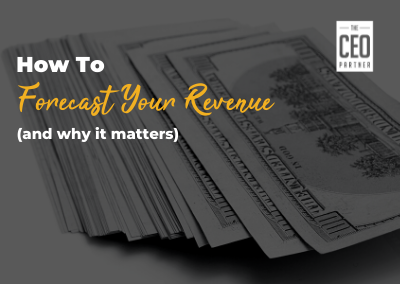Forecasting your revenue is a critical task that allows you to prepare your business for what’s ahead. There are a few easy steps that you can follow to forecast your revenue so you know more about the story your numbers are telling you.
How to Forecast Your Revenue
Consider the different revenue streams that you have. This can include:
- Digital Products
- 1:1 Services
- Programs
- Memberships
- Speaking Engagements
This will make it easier to know where your money is coming from. One stream may be more effective than another. Depending on how you maintain your accounting, it may be easier to forecast each stream separately and, then, add them together at the end.
Start by listing out all the products or services that you offer. Focus more on what the net revenue is for each item. This will ensure that you have already taken into consideration the expenses that will be spent to get you the intended revenue.
Forecast Your Revenue by Week or Month
You can choose to forecast by the week or by month. Look at past months to help you achieve your forecast. If you had revenue of $10,000 in April of 2019, you might expect $10,000 in April of 2020. However, there are other things to consider:
- New marketing strategies
- Trends happening in your industry
- New competition
- A change in products/services
Additionally, you should have a conservative and aggressive revenue number forecasted. The conservative number is where you should base your expenses from.
Forecast Your Expenses
Along with revenue forecasting, don’t forget to forecast your expenses. Some expenses stay the same regardless of how much you make (rent, website expenses, etc.) while others are proportionate to your revenue (sales incentives, marketing costs, product inventory).
It’s also a good idea to have a baseline revenue number established. This would be the revenue that you need to generate monthly simply to break even in business. It would be the total cost of all expenses that you have to incur each month.
The Importance of Forecasting
So why should you forecast your revenue? Forecasting revenue allows you to have greater control of your business. When you don’t know what money you’re bringing in, it can be easy to overspend – leaving you in the red, month after month.
By taking a more strategic approach to your operations, it allows you to figure out when you need to market to boost your income when to hire employees to address busier times, and much more. Otherwise, you run the risk of being completely unprepared for what’s to come.
Additionally, when you forecast, it allows you to improve your fulfillment and scheduling. Depending on the type of business that you operate, you may need to increase production when you see that revenue is anticipated to be higher than the previous month. You may need to adjust schedules so that you have the right people in the right areas.
Forecast Your Revenue to Improve Customer Service
You will also be able to enhance customer service when you have better control of when (and where) the money is coming from. Analyzing customer patterns will allow you to prepare your team and make more informed decisions throughout the way that you run your business.
The more detailed you become with forecasting, the more you can prepare. You may decide to focus more heavily on certain products or services because those are more highly sought after. It will allow you to deliver on what your target audience needs as opposed to having to deal with shortages or longer-than-anticipated scheduling periods.
Revenue forecasting benefits vary from business to business. What you can expect is that accurate numbers make it easier to be strategic in your plans and allocate your budgeted expenses more effectively.
Tips for Revenue Forecasting
We’re all busy but that doesn’t give us a pass for ignoring the numbers. The story they tell is valuable. Start forecast planning by looking at past trends and current revenue streams.
Use these tips when you forecast your revenue:
Look at a calendar
Knowing about upcoming events and holidays will make it easier for you to forecast more effectively. Some holidays may boost your revenue while others will detract from your sales. If you’ve been up and running for a few years, look back at the trends over the past years to see how certain holidays impacted your revenue. Notice any consistent themes or seasons over the years.
Identify the competition
You should always have your eye on the competition to see what they’re doing. If they’re running a big sale, it could have an impact on your revenue. Even if you have a significant amount of brand loyalty, people may go to your competition because of the prices, the products, or the unique experience that they’re offering. To keep your top line unmoved by what the competition is doing, you may need to run similar promotions to keep your customers from straying.
Work closely with marketing
Marketing is a great resource when you forecast your revenue. If it looks like you’re in a revenue slump, works with marketing – either your internal marketing department or a marketing firm. Let them know where your concerns lie so that you can employ a few marketing strategies. A good campaign can help to get more leads coming in and ensure that you don’t experience too much of a dip in sales.
Be Consistent!
Ultimately, the reason for revenue forecasting is to maintain consistency. If you don’t know what the numbers are, you can’t modify the way that you’re operating. Making use of historical data and paying attention to market trends will make it easier for you to plan accordingly. Businesses fail every day because of not forecasting sufficiently. Make it a priority and see the effect it has on the way that you operate.
How often are you forecasting your revenue? If you do not forecast your revenue regularly, it could cause quite an upset in your operations by not having a firm grasp on the numbers. Contact us today for more information on how to make your business a success!

